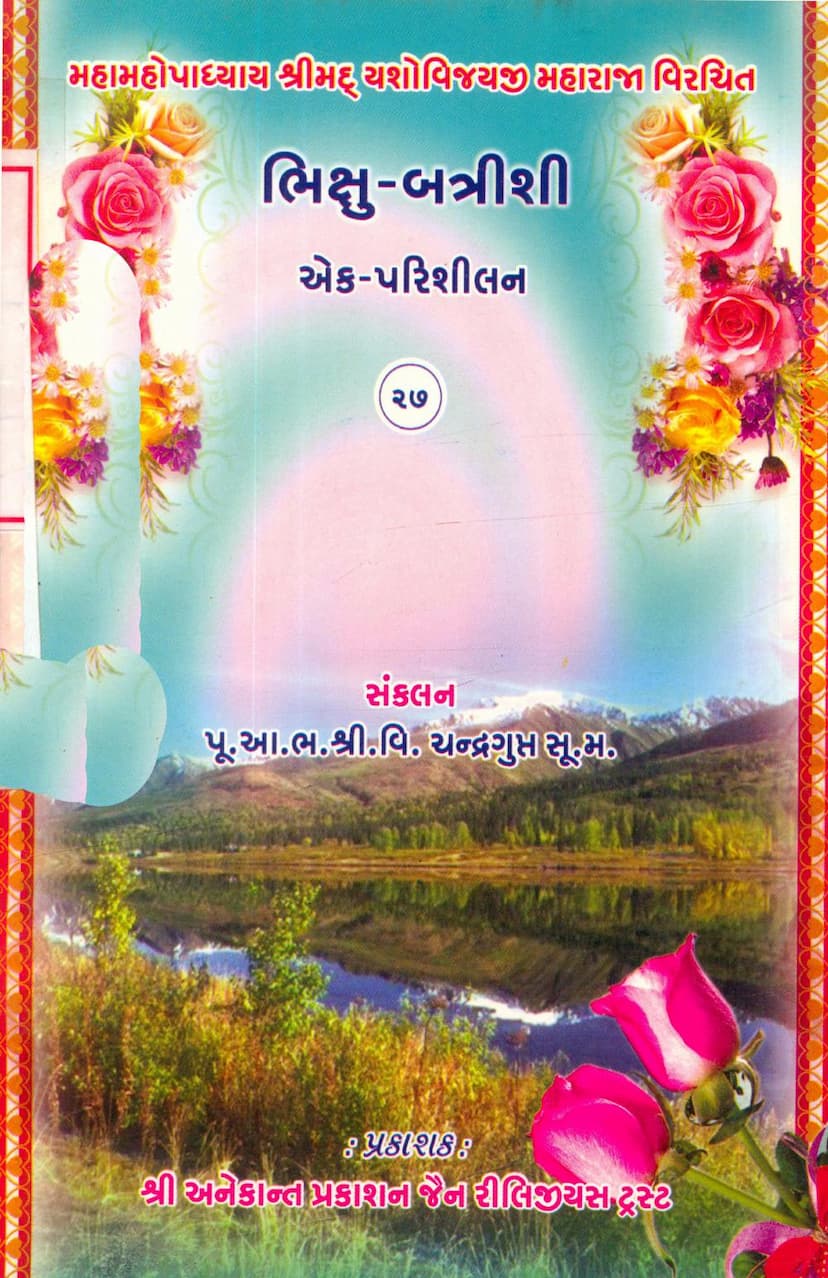Bhikshu Battrishi Ek Parishilan
Added to library: September 1, 2025

Summary
Here's a comprehensive summary of the Jain text "Bhikshu Battrishi Ek Parishilan," based on the provided pages:
This book, "Bhikshu Battrishi Ek Parishilan," is a commentary and analysis of the "Bhikshu Battrishi" (Thirty-two Verses on the Mendicant) composed by Mahamahopadhyay Shrimad Yashovijayji Maharaj. The commentary is authored by Pu. A. Bh. Shri Vi. Chandraguptasuri and published by Shri Anekant Prakashan Jain Religious Trust.
The central theme of the text is to elaborate on the true nature and characteristics of a Bhikshu, which in Jainism refers to a mendicant or monk, specifically a Bhavabhikshu (spiritual mendicant). The commentary systematically breaks down the original "Bhikshu Battrishi" verse by verse, explaining the profound meanings behind each shloka.
Key Concepts and Structure:
The commentary begins by explaining that the original "Bhikshu Battrishi" details the meditative and yogic qualities that are exclusive to Bhavabhikshus. While monks have many names like Muni, Nirgranth, and Angar, the term 'Bhikshu' is used here to highlight their pure state of existence.
The term "Bhikshu" traditionally means one who subsists on alms. However, in the Jain context, it signifies a state of blamelessness. These mendicants, even for their essential sustenance like food, completely abstain from sinful activities like cooking. The text emphasizes that those who do not commit sin even for their own maintenance would certainly not commit it for other purposes. Even while accepting alms, they remain mindful to avoid the sin of approval or endorsement. Despite being dependent on others for sustenance, they harbor no expectations, thus remaining undisturbed in their self-contemplation. This state is made possible by the supreme alms (Bhiksha) taught by Lord Mahavira, which is conducive to liberation.
The commentary is structured as follows:
-
Definition of Bhavabhikshu (First 16 Shlokas):
- The first sixteen shlokas define the Bhavabhikshu. These are individuals who have renounced both material (dravya) and inner (bhava) homes. They maintain a tranquil mind and do not desire the sensory pleasures they have once abandoned.
- A core understanding highlighted is that the body is impure, born of impurity, and impermanent. Those who strive for eternal liberation, understanding this, are Bhavabhikshus. Renouncing external things, if they remain free from attachment to the body and understand its impermanence, they face no obstacles in their spiritual pursuit.
-
Etymology and Synonyms of Bhikshu (From Shloka 17 onwards):
- Shloka 17: Explains the etymology of the word "Bhikshu" as one who pierces the eight karmas through austerity (tapas).
- Shlokas 18-22: Present twenty-eight synonyms for "Bhikshu," each with its meaning explained in the commentary. These synonyms offer a deeper understanding of the Bhikshu's true nature.
-
Characteristics and Virtues of Bhavabhikshu (Shlokas 23 onwards):
- Shlokas 23-24: Detail sixteen specific qualities or "lingas" of a Bhavabhikshu, including:
- Samvega: Intense desire for liberation.
- Vishayatyaag: Renunciation of sensory pleasures.
- Susheel Sangati: Association with virtuous individuals.
- Gyan, Darshan, Charitra: Right knowledge, perception, and conduct.
- Aradhana: Observance (especially at the time of death).
- Vinaya: Humility and respect.
- Tapa: Austerity.
- Kshama: Forgiveness.
- Mārdava: Gentleness.
- Rijuta: Straightforwardness.
- Titiksha: Endurance.
- Mukti: Freedom from attachment (even to spiritual aids).
- Adinata: Not being subservient or begging.
- Avashyak Vishuddhi: Purity in essential observances.
- The commentary emphasizes that possessing these qualities is crucial to being a true Bhikshu.
- Shlokas 23-24: Detail sixteen specific qualities or "lingas" of a Bhavabhikshu, including:
-
Distinction between Bhavabhikshu and Dravya Bhikshu:
- The text also discusses Dravyabhikshus (material mendicants), those who merely wear the outward appearance of a monk but lack the inner spiritual qualities.
- Shlokas 26-30: Detail the characteristics of Dravyabhikshus, highlighting their shortcomings such as:
- Violating the six types of living beings (shatkayabhed).
- Using food prepared with intention (audeshikam).
- Consuming impure water.
- Being involved in worldly activities (sadārambh).
- Begging from the simple-minded.
- Being poor, blind, or miserly (indicating a lack of inner resourcefulness).
- Killing immobile and mobile beings.
- Being unchaste (anabrahmachari).
- Holding false views (mithyadrushti).
- Accumulating possessions (sanchayin).
- Eating food with life (sachittabhojin).
- Lacking pure austerity and being engrossed in sin (mind, speech, body).
- Being like a carpenter who splits wood for livelihood (dravyato), or Brahmins who beg for material gain.
- Shlokas 31-32: Explain that even those who are pure and have experienced spiritual fervor (sanvignapakshik) or are on the path to renunciation (e.g., observing vows before initiation) can be considered Pradhan Dravya Bhikshus (principal material mendicants), as they are causes for future spiritual practice.
- The commentary strongly differentiates between true Bhavabhikshus, whose actions are motivated by inner purity and spiritual goals, and Dravyabhikshus, who merely adopt the outward appearance without the corresponding inner transformation.
-
Conclusion:
- The text concludes by reiterating that the true Bhikshu is characterized by the cultivation of these numerous virtues. Merely observing the external form is insufficient. The commentary underscores that the contemplation and internalization of these qualities lead to ultimate happiness and liberation (paramananda sampatti).
In essence, "Bhikshu Battrishi Ek Parishilan" serves as an in-depth guide to understanding the profound spiritual discipline and inner purity required to be a true Jain mendicant, highlighting the distinction between outward appearance and inner realization. It emphasizes that the journey to liberation is paved with the cultivation of specific virtues and a complete renunciation of worldly attachments and sins.